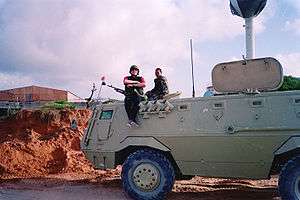United Nations Security Council Resolution 837
United Nations Security Council resolution 837, adopted unanimously on 6 June 1993, after reaffirming resolutions 733 (1992), 746 (1992), 751 (1992), 767 (1992), 775 (1992), 794 (1992) and 814 (1993), the Council condemned the attacks on the United Nations Operation in Somalia II (UNOSOM II) in which 24 Pakistani troops deployed in the Unified Task Force were killed and 56 injured, including 1 Italian and 3 American soldiers.[1]
| UN Security Council Resolution 837 | |
|---|---|
 Egyptian troops in Somalia | |
| Date | 6 June 1993 |
| Meeting no. | 3,229 |
| Code | S/RES/837 (Document) |
| Subject | Somalia |
Voting summary |
|
| Result | Adopted |
| Security Council composition | |
Permanent members | |
Non-permanent members | |
Acting under Chapter VII of the United Nations Charter, the Council re-emphasised the importance of the early implementation of the disarmament of all Somali parties, factions and movements, as well as neutralizing radio broadcasting systems that contributed to attacks towards United Nations forces. It also demanded that all parties in Somalia comply with the commitments they had undertaken in the agreements they concluded at the informal Preparatory Meeting on Somali Political Reconciliation in Addis Ababa, Ethiopia, reaffirming that the UN Secretary-General Boutros Boutros-Ghali is authorised to take action against those responsible for the armed attacks against UNOSOM II to establish its authority throughout Somalia.[2]
The Council concluded by encouraging the deployment of all UNOSOM II contingents to meet the full requirements of 28,000 men; urging Member States to contribute equipment to the Operation; and for the Secretary-General to report back on the situation within seven days of the adoption of the current resolution.
It was on this resolution that the decision was made to arrest General Mohamed Farrah Aidid who was responsible for the attack, although he was not captured.[3]
See also
References
- Durch, William J. (1996). UN peacekeeping, American politics, and the uncivil wars of the 1990s. Palgrave Macmillan. p. 343. ISBN 978-0-312-16075-3.
- Sarooshi, Danesh (2000). The United Nations and the development of collective security: the delegation by the UN Security Council of its chapter VII powers. Oxford University Press. p. 190. ISBN 978-0-19-829934-9.
- Bedjaoui, Mohammed (1994). The new world order and the Security Council: testing the legality of its acts. Martinus Nijhoff Publishers. p. 50. ISBN 978-0-7923-3434-7.
External links

- Text of the Resolution at undocs.org